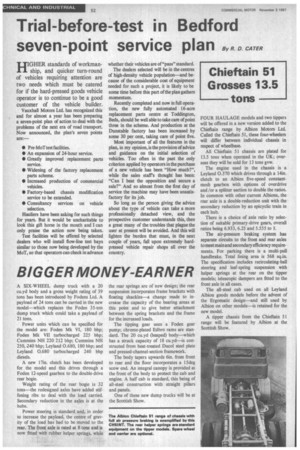Trial-before-test in Bedford
Page 54

If you've noticed an error in this article please click here to report it so we can fix it.
seven-point service plan Bv R. D. CATER irGHER standards of workmanship, and quicker turn-round of vehicles requiring attention are two needs which must be catered for if the hard-pressed goods vehicle operator is to continue to be a good customer of the vehicle builder.
Vauxhall Motors Ltd. has recognized this and for almost a year has been preparing a seven-point plan of action to deal with the problems of the next era of road transport. Now announced, the plan's seven points are:— • Pre-MoT test facilities.
• An expansion of 24-hour service.
• Greatly improved replacement parts service.
• Widening of the factory replacement parts scheme.
• Increased production of commercial vehicles.
• Factory-based chassis modification service to be extended.
• Consultancy services on vehicle selection.
Hauliers have been asking for such things for years. But it would be uncharitable to look this gift horse in the mouth and I can only praise the action now being taken.
Test facilities will be offered by selected dealers who will install flow-line test hays similar to those now being developed by the MoT, so that operators can check in advance whether their vehicles are of "pass" standard.
The dealers selected will be in the centres of high-density vehicle population—and because of the considerable cost of equipment needed for such a project, it is likely to be some time before this part of the plan gathers momentum.
Recently completed and now in full operation, the new fully automated 16-acre replacement parts centre at Toddington, Beds, should be well able to take care of point three in the scheme. And production at the Dunstable factory has been increased by some 30 per cent, taking care of point five.
Most important of all the features in the plan, in my opinion, is the provision of advice and guidance on the initial selection of vehicles. Too often in the past the only criterion applied by operators in the purchase of a new vehicle has been "How much?", while the sales staffs thought has been: "Can I beat the opposition and secure a sale?" And so almost from the first day of service the machine may have been unsatisfactory for its job.
So long as the person giving the advice about the type of vehicle can take a more professionally detached view, and the prospective customer understands this, then a great many of the troubles that plague the user at present will be avoided. And this will lighten the burden that must, in the next couple of years, fall upon extremely hardpressed vehicle repair shops all over the country.








































































































































